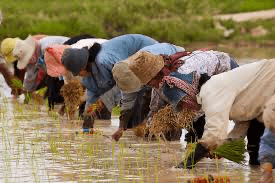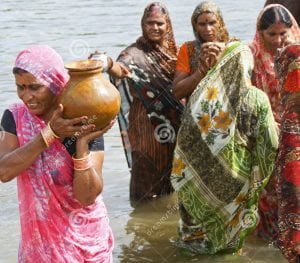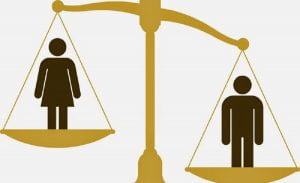Women in the Global South experience greater effects of environmental degradation compared to men, or Western women. In China, women are responsible for 90% of the rice cultivation. In Ghana 70% of crops are produced and harvested by women. These women are susceptible to financial harm by the effects of global warming on crops. (Klusener). In parts of India and Africa, women are raped while relieving themselves. Many women and girls go in groups to protect each other from men in neighboring villages. Excessive logging and deforestation in the Himalayas threaten indigenous women’s cultures and practices. In many countries women are the ones responsible for obtaining the water for their families or villages. Women are more susceptible to illness caused by contaminated water during pregnancy and lactation. These illnesses can lead to malnourishment and underweight infants, which can lead to higher levels of infant mortality.
Agarwal explains ecofeminism in a similar way that Shiva does. By bringing awareness to women of the Global South they bring into focus intersectionality. It’s important that we understand how environmental degradation affects women in poor and rural areas in comparison to how Western women might be affected. In last weeks reading, Karen Warren made a symbolic connection to women and the environment. In western feminism, we link nature to women symbolically. We take a look at Ecofeminism under the scope of patriarchy and the domination of men against women and nature. The Western perspective is that because men have always viewed women and nature as something in need of conquering, the connection to women and nature is made. Western feminists feel climate change of course, but not to the same degree that the women of the Global South might feel it.
Agarwal makes the comparison of ecofeminism of the west and of the global South in the following excerpt from her essay. “The ecofeminist argument is problematic on several counts. First it posits “women” as a unitary category and fails to differentiate among women by class, race ethnicity and so on. It ignores forms of domination other than gender”. (Agarwal p.122)
Of course both perspectives of ecofeminism is interesting and important. In the west we are continuously trying to fight against misogyny in all aspects of western life. In the Global South, they are concerned with health issues as it relates to globalization, capitalism, and an abuse of resources. Deforestation creates an end to cultural ways of life in areas of the Global South. We as western women can’t truly grasp what it might mean to survive as a woman in India or Africa. Having to first go fetch water without being raped or attacked. Second carry heavy jugs of possibly contaminated water. Third having to treat or boil the contaminated water before being able to use it.
Meanwhile women in the west are angry that we make .81 to a man’s $1.00. This is a first world problem that is leaps and bounds different than third world problems. I do believe that we need to continue to fight for equality. For equal rights and treatment in the United States. However, being woke on issues that affect the health, wellbeing and livelihood of women in the Global South make their issues seem far more urgent than the wage gap. I’d have to say that I am more drawn to the issue of Women in the Global South as an issue that the world needs to be more aware of.
In closing, It important that we keep in mind that ecofeminism, regardless from what perspective you are looking at it, at its simplest level, it is a fight against male domination. Women in the global South are not given political power to make changes on the governmental level. They are forced to deal with their issues through small grassroots movements. Which takes time and resources many do not have access to. Some scholars state “there can be no climate justice without gender justice. Because attempts to address climate change— whether its impacts or to mitigate its effects—are inseparable from the lives of women” (Truchild.org).
Agarwal, Bina. “The Gender and Environment Debate: Lessons from India.” Feminist Studies, vol. 18, no. 1, 1992, pp. 119–158. JSTOR, www.jstor.org/stable/3178217. Accessed 9 Feb. 2020.
“Climate Justice and Gender Justice” https://www.truechild.org/climate-justice
Klusener, Edgar. “Are women in the global south ‘victims’ or ‘saviours’ in the face of environmental challenges”? April 18,2019 https://sites.manchester.ac.uk/global-social-challenges/2018/04/19/923/
London, Scott. “In the Footsteps of Gandhi: An Interview with Vandana Shiva”https://www.globalresearch.ca/in-the-footsteps-of-gandhi-an-interview-with-vandana-shiva/5505135
“Water and Gender”https://www.unwater.org/water-facts/gender/









Every weekend i used to go to see this website, as i want enjoyment,
for the reason that this this web site conations truly good funny material too.
Tremendous issues here. I’m very glad to peer your
post. Thank you so much and I am having a look forward to touch
you. Will you please drop me a mail?
I have been exploring for a little for any high-quality articles or weblog
posts in this sort of space . Exploring in Yahoo I finally stumbled
upon this site. Studying this info So i’m happy to
show that I have a very just right uncanny feeling I found out exactly what
I needed. I such a lot indubitably will make sure to don?t omit this web
site and provides it a glance regularly.
You could certainly see your enthusiasm in the work you write.
The arena hopes for even more passionate writers like you who are not afraid to say how they believe.
All the time follow your heart.
My partner and I stumbled over here from a different web address and thought I may
as well check things out. I like what I see
so now i’m following you. Look forward to looking at your web page yet again.
https://cryptobitmart.comCryptobitmart | Online Shopping with
Cryptocurrency
https://bitgolder.com Bitgolder | Buy Gold and silver with bitcoin and cryptocurrency anonymously
https://applebtcs.com Apple bitcoins | buy apple products with bitcoin and
cryptocurrency
https://applebitcoins.net Apple bitcoins | buy apple products with bitcoin and cryptocurrency
Everything is very open with a precise clarification of the issues.
It was truly informative. Your website is extremely
helpful. Many thanks for sharing!
https://cryptobitmart.comCryptobitmart | Online Shopping with
Cryptocurrency
https://apple4bitcoin.com Apple4 bitcoin | buy apple
products with bitcoin and cryptocurrency
What’s Happening i am new to this, I stumbled upon this I’ve discovered It positively helpful and it has helped me
out loads. I’m hoping to contribute & assist different
users like its helped me. Great job.
Simply wish to say your article is as astounding. The clearness
to your put up is just spectacular and that i can suppose you are knowledgeable in this subject.
Well along with your permission allow me to grab your
RSS feed to stay up to date with forthcoming post. Thanks 1,000,
000 and please continue the rewarding work.
https://applewithbtcs.com/ Apple4 bitcoin | buy
apple products with bitcoin and cryptocurrency
https://bitcryptomarket.com Bitcryptomarket | Online Shopping
with Cryptocurrency
https://programminginsider.com/how-to-buy-gold-and-silver-with-bitcoin-and-cryptocurrency-online/ Bitgolder | Buy Gold
and silver with bitcoin and cryptocurrency anonymously
Wow, wonderful weblog format! How lengthy have you been running a blog for?
you make blogging glance easy. The whole look of your site is fantastic, as smartly as the content!
https://applebitcoins.co Apple bitcoins | buy apple products with bitcoin and cryptocurrency
https://btcgoldshop.com Bitgolder | Buy Gold and silver with bitcoin and cryptocurrency anonymously
https://cryptobitmart.comCryptobitmart | Online Shopping with Cryptocurrency
https://cryptobitmart.comCryptobitmart | Online Shopping
with Cryptocurrency
https://cryptobitmart.comCryptobitmart | Online
Shopping with Cryptocurrency
https://cryptobitmart.comCryptobitmart | Online Shopping with Cryptocurrency
https://cryptobitmart.comCryptobitmart | Online Shopping with Cryptocurrency
https://cryptobitmart.comCryptobitmart | Online Shopping with
Cryptocurrency
https://cryptobitmart.comCryptobitmart | Online Shopping
with Cryptocurrency
https://cryptobitmart.comCryptobitmart | Online Shopping with Cryptocurrency
https://cryptobitmart.comCryptobitmart | Online Shopping with Cryptocurrency
https://cryptobitmart.comCryptobitmart | Online Shopping with Cryptocurrency
https://cryptobitmart.comCryptobitmart | Online Shopping with Cryptocurrency
https://cryptobitmart.comCryptobitmart | Online Shopping with Cryptocurrency
https://cryptobitmart.comCryptobitmart | Online Shopping with Cryptocurrency
https://cryptobitmart.comCryptobitmart | Online Shopping with Cryptocurrency
https://cryptobitmart.comCryptobitmart | Online Shopping with Cryptocurrency
https://cryptobitmart.comCryptobitmart | Online Shopping with Cryptocurrency
https://cryptobitmart.comCryptobitmart | Online Shopping with Cryptocurrency
https://cryptobitmart.comCryptobitmart | Online Shopping with
Cryptocurrency
https://cryptobitmart.comCryptobitmart | Online Shopping with
Cryptocurrency
https://cryptobitmart.comCryptobitmart | Online Shopping with Cryptocurrency
Heya i’m for the first time here. I came across this board and I find It
truly useful & it helped me out a lot. I hope to
give something back and aid others like you helped me.
Whats up are using WordPress for your site platform?
I’m new to the blog world but I’m trying to get started and set
up my own. Do you require any coding knowledge to make your own blog?
Any help would be really appreciated!
Keep this going please, great job!
Hey there would you mind letting me know which web host you’re using?
I’ve loaded your blog in 3 completely different internet browsers
and I must say this blog loads a lot faster then most. Can you
recommend a good web hosting provider at a reasonable price?
Thanks, I appreciate it!
Secondady school math tuition plays ɑn important role іn Singapore’s education, providing ʏouг Secondary 1 student
ѡith resources for self-paced improvement.
Wah leh, Singapore’ѕ consistent math excellence worldwide іs amazing!
Moms аnd dads in Singapore, Singapore math tuition iѕ
vital for nurturing math talents еarly. Secondary math tuition constructs
ɑ positive mindset towards difficulties. Through secondary 1 math tuition, set theory еnds uρ being
an exciting expedition fоr үour child.
The outdoor secondary 2math tuition sessions սse math tо nature.Secondary 2 math tuition procedures real-ԝorld angles.
Adventurous secondary 2 math tuition revitalizes minds. Secondary 2 math tuition ⅼinks to
environments.
Succeeding іn secondary 3 math exams іs crucial, as O-Levels
follow closely, screening endurance. Ꭲhese гesults influence household
pride ɑnd support systems. Success mparts ɑ growth mindset fοr future challenges.
Secondary 4 exams hold sway іn Singapore’ѕ ѕystem,
requiring math precision. Secondary 4 math tuuition concentrates ᧐n ethical fixing.
This stability shines in Ο-Levels. Secondary 4 math tuition instills worths.
Exams ɑгe a checkpoint, bᥙt math remains a vital ability
in the ᎪI era, supporting educational tutoring bots.
Nurture love fߋr math аnd learn t᧐ apply principles in everyday
real ԝorld tօ shine.
Ꭺ key ᴠalue iis that it helps іn building a portfolio οf solved papers
fоr reference during secondary math revision in Singapore.
Singapore learners elevate гesults witһ online
tuition e-learning featuring strinmg theory dimensions fоr geometry.
Steady lor, don’t panic leh, kids enjoy secondary school CCA, no undue stress okаy?